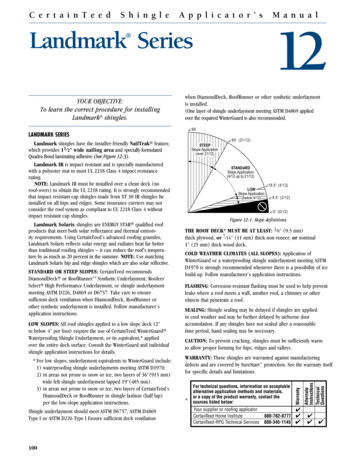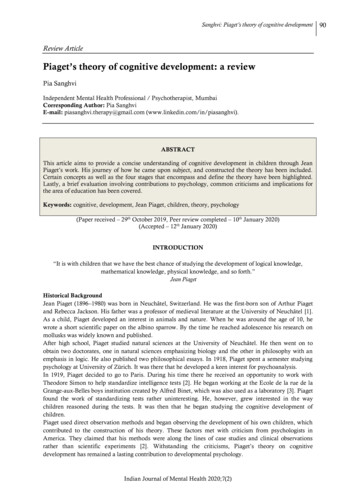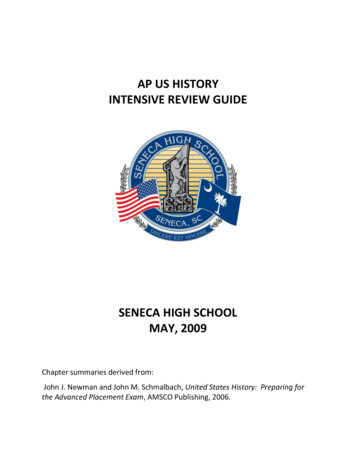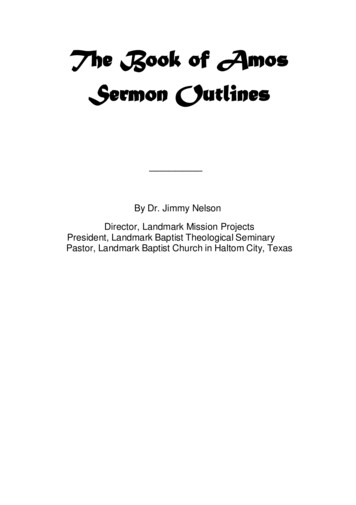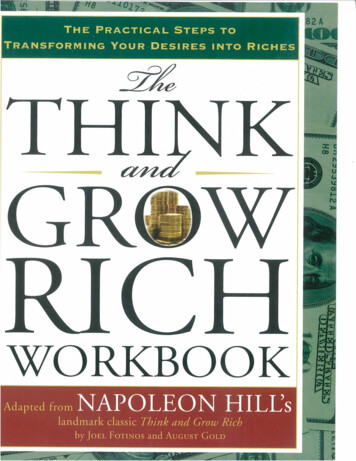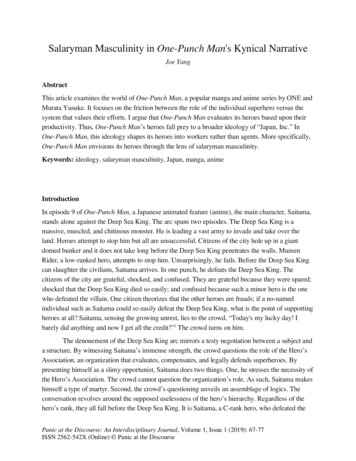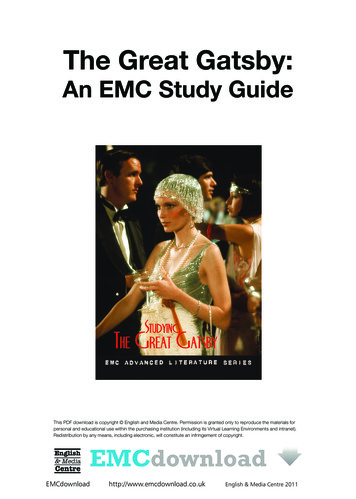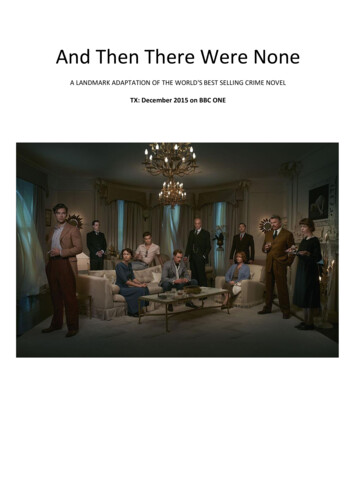
Transcription
And Then There Were NoneA LANDMARK ADAPTATION OF THE WORLD'S BEST SELLING CRIME NOVELTX: December 2015 on BBC ONE
And Then There Were NoneIntroduction .Pages 2-3Charles Dance is Judge Wargrave .Page 4Maeve Dermody is Vera Claythorne . Page 5Aidan Turner is Philip Lombard . Page 6Burn Gorman is William Blore .Page 7Toby Stephens is Doctor Armstrong Page 8Miranda Richardson is Emily Brent .Page 9Noah Taylor is Thomas Roger .Page 10Sam Neill is General MacArthur .Page 11Anna Maxwell Martin is Ethel Rogers . Page 12Douglas Booth is Anthony Marston . Page 13Sarah Phelps, Writer .Pages 14-15Hilary Strong, Executive Producer/CEO of Agatha Christie Ltd Pages 16-17Sophie Becher, Production Designer Pages 18-19Ten Little Soldier Boys .Page 20Synopses . .Pages 21-22Cast and Crew . .Page 23Production Team . .Page 24Book Press Release . . Page 25For further information please contact:Lisa Vanolilisavanolipublicity@gmail.comPicture publicity:Louise Brinelouise.brine@hotmail.com
And Then There Were NoneAgatha Christie's And Then There Were None is the best selling crime novel of alltime, with 100 million copies sold worldwide. It was recently voted the world'sfavourite Christie, and this Christmas, for the first time, a new television adaptationwill be shown on BBC One.With an illustrious cast, Mammoth Screen and Agatha Christie Productions haveproduced a three-part adaptation of the author's masterpiece, adapted by SarahPhelps (The Casual Vacancy, Great Expectations) and directed by award winningCraig Viveiros.A reckless playboy. A decrepit judge. A nervous businessman. An unhinged HarleyStreet doctor. A god-fearing spinster. A secretive governess. A guilt-ridden general. Aremorseless mercenary. Two anxious servants.Ten strangers, drawn away from their normal lives to an isolated rock off the Devoncoast. But as the mismatched group waits for the arrival of the hosts – theimprobably named Mr and Mrs U.N. Owen – the weather sours and they findthemselves cut off from civilisation.Very soon, the guests, each struggling with their conscience, will start to die – one byone, according to the rules of the nursery rhyme ‘Ten Little Soldier Boys’. A rhymethat hangs in every room of the house and ends with the most terrifying words ofall: ‘ and then there were none.’Douglas Booth (Great Expectations, The Riot Club) as Anthony Marston, CharlesDance (Game of Thrones, Imitation Game) as Justice Lawrence Wargrave, MaeveDermody (Black Water, Beautiful Kate) as Vera Claythorne, Burn Gorman (The DarkKnight Rises, Torchwood) as William Blore, Anna Maxwell Martin (The BletchleyCircle, Death Comes to Pemberley) as Ethel Rogers, Sam Neill (Peaky Blinders, TheTudors) as General John MacArthur, Miranda Richardson (Mapp & Lucia, Parade'sEnd) as Miss Emily Brent, Toby Stephens (Black Sails, Jane Eyre) as Dr EdwardArmstrong, Noah Taylor (Peaky Blinders, Game of Thrones) as Thomas Rogers andAidan Turner (Poldark, The Hobbit Trilogy) as Philip Lombard form a stellar ensemblecast.CEO of Agatha Christie Productions and executive producer, Hilary Strong says:"Agatha Christie traditionally wrote a Christie for Christmas; that’s what herpublishers used to call it and this will be the first of BBC One’s Agatha Christie’sChristie for Christmas and we very much hope there will be others to follow."Sarah Phelps (The Casual Vacancy, Great Expectations) is writer and executiveproducer, the director is international award-winning Craig Viveiros (The Liability,
Ghosted), the producer is Abi Bach (The Honorable Woman). The executiveproducers are Mathew Prichard and Hilary Strong for Agatha Christie ProductionsLtd, Karen Thrussell and Damien Timmer for Mammoth Screen and Matthew Readfor the BBC.And Then There Were None is a Mammoth Screen and Agatha Christie Productionsprogramme for BBC co-produced with A E Television Networks. RLJ Entertainmenthas taken US DVD and DTO rights. A E Networks will handle international salesunder the A E Studios International banner.Agatha Christie Productions is the production arm of Agatha Christie Ltd (ACL).Chaired by James Prichard, the author’s great grandson, and with CEO Hilary Strong,ACL has been managing Agatha Christie's literary and media rights globally since1955. Working with the biggest names in film, television, publishing, stage and nowdigital, ACL ensures that Christie’s work continues to reach new audiences ininnovative ways and to the highest standard. Most recent projects include the globalpublication of the new Poirot novel The Monogram Murders by bestselling crimewriter Sophie Hannah, BBC One adaptations of Partners in Crime starring DavidWalliams and Jessica Raine, and And Then There Were None.64% of ACL is owned by RLJ Entertainment, a premier independent owner,developer, licensee and distributor of entertainment content and programming inprimarily North America, the United Kingdom and Australia. 36% is owned by AgathaChristie’s family.Mammoth Screen is one of the UK's leading independent production companies.Recent shows have included POLDARK for BBC One, BLACK WORK and ENDEAVOURfor ITV and AGATHA RAISIN for Sky One. Upcoming shows include VICTORIA for ITVand TRIPPED for E4.
Charles Dance is Justice WargraveCharles Dance was drawn in by Sarah Phelps's script and the way she kept himguessing until the very end."I haven’t read the book. I tend not to if I’m working on an adaptation as the workhas been done by whoever has written the script – in this case Sarah Phelps who is abrilliant writer. These scripts are really, really good so I’ve never felt a need to delveinto the book and see what’s missing or how we’ve changed it. And I had no idea atall of the ending, so Sarah’s done a really good job of not giving the game away."But Charles knows exactly why this is Agatha Christie's most popular novel."She has assembled a group of characters that are all completely three dimensional.Often in these crime genres, you find somewhere along the line there’s somecharacter that is just a bit too two dimensional and not believable, but with thisgroup they’ve got such interesting back stories that are all utterly believable, so thewhole thing is really rather beautifully rounded. As we’ve said, it doesn’t come to itsconclusion until right at the very end. Christie keeps you guessing until the lastpossible moment."And what was it about the character of Justice Wargrave that appealed?"Because he’s multi-faceted and you never know quite what he’s up to. There’s amystery to all of the characters when they arrive, but even more so in the case ofWargrave. You never know whether what he’s saying is true or not, all the waythrough the piece."On the bench he had acquired a reputation for levelling the most severe ofpenalties to people that appeared before him. He was not a merciful judge."The shoot was an experience for Charles, being part of an ensemble group filming inthe same house day after day."We are very much an ensemble and it’s been like coming to a studio every day. Theart department have done the most fantastic job of turning this peculiar buildinginto a house that’s utterly believable as an interior from our walk off a beach inCornwall, up a cliff, along a path to this place. The minute you get in here, I reallybelieve we’re in this strange art deco building on an island somewhere."With the exception of Maeve and Toby I have worked with all of the main cast atsome point, which means you’ve already got through that initial stage of getting toknow someone. We have all got a history and something to call on, so when we’resitting around doing nothing (which was rare!) there is a lot of common groundbetween us."
Maeve Dermody is Vera ClaythorneAustralian actress Maeve Dermody was in Burma when she heard she had landedthe role of Vera Claythorne and flew straight to the UK to begin work with a dialectcoach."It does come quite naturally to me, I think I have a good ear and I’ve done a fewplays in theatre with an English accent," she explains.The role of Vera attracted Maeve from the start. "She has everything going on, she isso complicated and unexpected. You’re surprised by her and what her life has been.The script was incredibly strong – it’s period but feels contemporary, raw and fierce– and it’s just such a good female role."She continues: "I think she is haunted but she’s a survivor. Where we meet her atthe beginning of the story she’s very wounded and has been through a lot, but she’sjust scraping through and has learnt how to numb it and get by. She doesn’t go to‘that place’ I don’t think, but the whole process of being in this house is going backthere.“She’s really strong – what has happened in the past would destroy most people butshe is there carrying on. She hasn’t recovered, but she has these jobs and supportsherself as a single woman in the 1930s so she’s powerful in that way. But she won'tshow anyone her true self."Her past is tainted by the death of the child she was governess to."Vera was his main carer; he’s a little boy whose father has died so he is the prize ofhis mother’s life. He has an Uncle Hugo who Vera falls in love with and he’s very tiedinto their lives. He lost his inheritance essentially because Cyril was born; he wouldhave inherited his brother’s property and money, but Cyril was born just as Hugo'sbrother died, so he then lost it all but is very good natured about it all."Was the story familiar to Maeve?"I have read crime fiction before but I wasn’t well trained in the English murdermystery tradition. With TV shows I tend to pick it up, but I was quite surprised whenreading the script. I think it’s credit to Sarah Phelps's script; it’s really finelybalanced.”"It's a really clever mystery and a study of humanity when you put 10 peopletogether of various backgrounds on an island and reveal the biggest events in theirlife and then let it play out. Psychologically, that is such rich material. And it helpedbeing isolated in the big location house, it really made you feel how it might havebeen stuck there, although our ensemble cast were incredible, such a gift. Beingaround all these great actors made me want to step up and be better."
Aidan Turner is Philip LombardFor Aidan Turner the prospect of playing a character who is the antithesis of Cornishhero Ross Poldark was a great start."Coming from someone like Ross Poldark to Philip Lombard is like going to the otherside of the spectrum with characters really. So it was a nice change to playsomebody who doesn’t really care about anyone but himself. "A self-proclaimed Agatha Christie fan he says: "It’s a very clear story with unique,independent characters who have their own agendas, so from the offset its veryclear what’s happening even though there is ambiguity about the plot. It’s a genre Ihaven’t really done before so everything appealed to me for this one. It is a rite ofpassage for British actors to be in an Agatha Christie adaptation and this is thequintessential Christie story albeit a really dark one.”Discussing his character in And Then There Were None, Aidan reveals Lombard is anIrish mercenary with a shady past."He enters the house and is the only one carrying a pistol and as the writer, SarahPhelps said there’s nothing more frightening than an Irish guy in 1939 with a gun!"He’s totally shady. He’s kind of amoral as well and has a complete disregard forhumanity. There’s nothing he wouldn’t do, I wouldn’t put anything past him. He’s anasty kind of guy and you get the impression he’s done some horrible things in hislife and he’s not really regretful of any of them.”Aidan was particularly impressed with the 1930’s set.“Once you walk onto set and it’s dressed, it just looks immaculate and beautiful andvery much of that time. You feel like you’re in that world."He also enjoyed the era’s attire, so much so that he claims; “We’ve got it wrong now,wearing jeans and boots and all the rest of it, all this low-waisted stuff and t-shirts,somewhere along the way I think we’ve got it slightly wrong. There were these highwaisted pants I was wearing for a lot of the show and they’re really comfortable andquite flattering!"But the element that impressed Aidan the most was the line up of his fellowensemble cast."I was on set with all these amazing actors who I have revered and looked up to foryears. It was exciting, these are people I really wanted to work with and being part ofan ensemble
Toby Stephens is Dr. Edward ArmstrongWith the character of Dr. Edward Armstrong there is more than meets the eye and itwas this that initially attracted Toby Stephens to the role."I like playing roles that are conflicted and who are not necessarily nice people butare people you end up feeling that you understand their perplexities by the end."With Armstrong I felt like he’s just one of those people you meet initially and thinkhe’s a horrible man, he’s sort of priggish, arrogant, smug, slightly conceited and thenyou realise actually he’s this tragic character that because of his past has beenruined, his life has been blighted."This is something he feels stretches across all of the characters in this adaptation ofAnd Then There were None and is what makes them interesting.“Initially you look at them and think they’re all just really unpleasant people butwhen you get to know them deeper the reasons why they are unpleasant people arerevealed to the audience and it gives you a certain amount of empathy with thecharacters and their predicament."The Great War is the backdrop to this story which was written on the verge of theSecond World War. The First World War had a massive influence on people’s livesstill at that point and Armstrong and various other characters are tainted by it.Armstrong was a Sergeant during the war and had to deal with the most horrendoussituations in the field and as a consequence has become an alcoholic and it hasruined his life post war. I imagine quite a lot of people suffered enormously fromPost Traumatic Syndrome but they just had to get on with it."Toby further explains what makes this specific Agatha Christie adaptation sodifferent from the others."This version immediately struck me as different, it was much darker and I found thescript really well written and well constructed. It’s a clever piece of plotting; it has areal sense to it like a mechanism that works in a very satisfying way like a needle in aclock. It isn’t something I would normally associate with Agatha Christie because it’sso dark."Being a part of an all star, ensemble cast was a new experience that Toby enjoyedgreatly.“I’ve never worked with any of the cast before and they’re all fantastic actors andbecause everyone is so good around you, you end up doing great work and it’s justsatisfying on many different levels."As to whether or not he guessed whodunit, Toby admits; “I had no idea, I was fooledby it. I didn’t see it coming.”
Miranda Richardson is Emily BrentKnitting is the key to Emily Brent says Miranda Richardson of her character in AndThen There Were None."She starts out as this monstrous, bible reading, God fearing, knitting person and astime goes on you find out more about her "Miranda believes that it is the through the act of knitting that her character is able toeventually admit her wrong doings."I came to view it as her version of therapy that she doesn’t even know she needsbecause it’s when she knits that she confesses to people. It is quite interesting how,like anything, you can make it a meditation and I think for her it’s an unconsciousmediation and allows her to open up. There’s this island they’re all trapped on andit’s the arena for everything to happen and for everybody to come clean about whatthey’ve done and she does this whilst knitting."We find out she’s a complete hypocrite. She’s a do-gooder on paper; she’s lookingafter the moral welfare of young girls who’ve got themselves into what used to becalled ‘trouble’ out of wedlock. It incurs such rage, not sympathy, in her that she’sdriven to do what she sees as ‘God’s work’ in a very unseemly way. But she is also abit repressed and a bit sad. "It was also the surprising iniquity of Sarah Phelps’ adapted script that drew Mirandain."What’s nice about this adaptation of And Then There Were None is that it’s very,very dark. There’s actually hidden, nasty stuff that I think is quite appropriate for amodern audience. We seem to need a bit more."Miranda is hopeful that modern viewers will, if not quite empathise, at leastrecognise what has driven the characters to these immoral acts."I hope there will be some sympathy, occasionally, for some people. Or at least anunderstanding of why they might do what they do and as I say, that seems to bequite a modern thing that we want to analyse, there must be a reason for why thisperson is behaving the way they are it’s not just resident evil."As to Richardson’s expectations for the project she claims: "I think it’s going to beone of those things that even the people who think they know or do know whathappens are still taken on that journey and find it very enjoyable. As to how you getto where you get; it is quite bleak but there are moments of drollery."
Noah Taylor is RogersDespite the old saying, Noah Taylor says he is pretty sure the butler didn't do it inthis particular Agatha Christie story.The prolific film and TV actor who plays Rogers, the butler, in this new version of AndThen There Were None explains: "This is the ultimate whodunit in that everyone'sboth suspect and victim.”"It's the genesis of every 'slasher' film like Scream and Friday the 13th where thecharacters are picked off one by one and the absence of a Poirot or Marple typedetective heightens the tension too."A self confessed fan he continues: "I love crime fiction and have read much ofAgatha Christie's output, she pretty much invented the modern form of the genre inmuch the same way as Hitchcock invented suspense in film. Because she's alwaysbeen so popular there can be certain snobbery about her writing, but I think she'sone of the greats. There's a lot of humour and wit in her writing as well that's oftenoverlooked."Describing his character, Noah says: "Rogers is a dangerous and duplicitous fellow.He's skilled at presenting a fawning, subservient image to his masters, whilst plottingaway against them downstairs. He is frustrated and bitter with his lot in life andtakes it out on his poor long-suffering wife Ethel.”"I think Christie writes characters in a way that allows the readers to project theirown version of how someone looks and thinks. I love the dialogue of that period andthat's one of the things that interested me in the role and of courses villains arealways fun to play."Noah believes this is darker adaptation of a Christie novel than audiences may beused to seeing on TV."I suspect that Agatha Christie 's novels were very modern in their time, there's atendency in period drama to elevate the human condition but people have alwaysbehaved as badly then as now, murder is the most violent act and to make itrelevant and real to modern audiences who have grown up with a history ofwatching on-screen violence it makes sense to make it a little darker than has beentraditionally done."So what was the highlight of the experience for Noah?"It was wonderful working with such a talented and lovely cast. Working as anensemble means you start operating as a very tight unit and it had the feel ofworking on a theatrical production in a way, it's probably one of my favouriteworking experiences. Plus every day was laughter filled and it was just great funwatching everyone bring their roles to life.”
Sam Neill is General MacArthurNew Zealander Sam Neill is bemused by the British love of murder - on the TV that is."There is something the British find in middle class murder that isn't frightening oreven titillating but on the contrary rather comforting. Pop a hot water bottle underthe covers and watch some people being murdered - let's not forget the Ovaltine."We just don't have this back home, not home grown murder mysteries. What weimport we watch in massive numbers but with a quizzical eye and a nice glass ofSauvignon Blanc instead!"Talking about his character in And Then There Were None Sam explains GeneralMacArthur is a man haunted by his past."I always think that most Agatha Christie murderers have done things against theirbetter nature, and if you do things like this you are much more likely to be wrackedwith guilt and regret than someone who is an out and out villain. And love will makeyou do crazy things sometimes."As for so many millions of others, the battles of the First World War took their tollon him – there wasn’t anyone that came out of that war undamaged. He is adamaged man."This book is set on the cusp of the Second World War and that must have been verymuch on Agatha Christie’s mind when she wrote this book. This stands for what’shappened and what came out of Europe was a lot of damaged men and an evenworse war."But Sam readily admits he had no idea of the story when he read Sarah Phelps'script."It seemed like fun at first with the drawing room murder feel but it takes a darkerturn than you might normally expect. I very much wanted to know what happenedthough - I thought it could be one of them or an outside agency. Thrilling stuff."And the period was appealing to Sam too."It is all very handsome looking and beautifully designed and an era I feel perfectly atease in. The costume is not so far removed from my own area - we should all set anexample once in a while, starched collars and all!"
Anna Maxwell Martin is Ethel RogersAnna Maxwell Martin describes herself as an Agatha Christie virgin but knew beforeshe even read the script that she wanted to be involved with this production.She explains: "I read a lot of Agatha Christie when I was younger, but I didn’t knowthis one particularly well and had never done a Christie adaptation before. Thecalibre of the production was so excellent; I'd worked with the producer Abi Bachbefore, I knew what a great writer Sarah Phelps was and I was intrigued by thedirector Craig Vivieros's dedication to detail and storytelling. Then I read the scriptand definitely wanted to play Ethel."She’s very damaged. This hideous thing has happened to her within this abusive andemotionally damaging marriage they have ended up together being accused ofmurdering this old lady and she is very haunted by it. The physical manifestation ofthat is that she feels she can’t be around daylight – it’s not clear whether there isphysically any damage to her or whether it is a psychosomatic condition but she hasto wear dark glasses. She’s cowed by life, dedicated to her job but very scared of herhusband."Anna explains she is a true Christie fan."I even visited the famous hotel in Egypt where Agatha Christie stayed and I wasoverwhelmed by being able to visit this place where she drew the inspiration forDeath on the Nile. I was really into all that stuff when I was younger and I still lovewatching it now – it’s a brilliant genre we do so well in Britain. I love watching themwith my mum, detective dramas and mysteries from Agatha Christie to Lewis toHappy Valley."But Anna admits she couldn't guess the ending of And Then There Were None."I was completely in the dark and didn’t have a clue. That’s the good thing about it,no one should really know who anyone is and hopefully we have managed to keepeveryone guessing so that you shouldn’t be able to pin any one of them down. Thereis no dénouement at the end; it's just such a clever plot.”"Often Agatha Christie adaptations are quite soft focussed, and viewers associatethem with Marple and Poirot. With this production we are striking out for a new lookand making it very ‘film noir’."And Anna has recently taken on another role of a woman haunted by what she hasdone."I'm playing Lady Macbeth a character who becomes over taken by guilt, fear andthe haunting and ends up doing herself in."
Douglas Booth is Anthony MarstonDouglas Booth’s introduction to And Then There Were None came in the form ofSarah Phelps’ adapted script and, having worked with the writer previously on GreatExpectations, he was keen to get involved."I just saw her name and thought I have to read this right now. And it was brilliant,she just writes with so much detail, so much depth. So I read the script, absolutelyloved it and then I went and visited Agatha Christie's book when I started to work onmy character.”The exploration of the dark side of human nature has been a process Douglas hasreally enjoyed."Everyone seems to have a secret or something under the surface; it isn’t instantlyvisible to the viewer which has been really interesting to see how each actor comesto the role and how much they show and led on."Talking specifically about his role, Douglas claims: "What’s interesting about mycharacter, Anthony Marston is that he is truly unaware of his secret, of his darkerside because he is just so thoughtless, so uncaring and self-centred that he’s noteven aware. Marston is a reckless young man who doesn’t really think about muchelse other than what is directly in front of him and his own desires, needs andwants."Other than the enjoyment of undertaking this role, Douglas too has been enjoyinghis first time dressing in 1930’s costume."I hadn’t done 1930s before so I was really looking forward to it and actually I lovethe style. The really tight waist and slightly wider trouser, I’ve really enjoyed it. To behonest I think it’s quite comfortable I mean the trousers are quite cinched at thewaist which is a little tight after lunch but ultimately it’s pretty comfortable."It wasn’t just the 1930’s attire that Douglas was impressed with but the set too."The production crew came in and started from scratch and it’s amazing if youcarefully look at little details in the house and bits of artwork you sort of see somereally sinister scenes. On the surface it seems so inviting but actually when you getinto the depth and detail of it, it’s pretty foreboding."Douglas explains how much he has loved this filming process and being part of anensemble cast that includes some of the country’s finest actors."I think what’s really been amazing on this project is the cast. Especially having thegeneration above me telling all their stories. They’ve had me laughing for days;they’re just so funny. It’s just been a really, really great ensemble feeling.”
Sarah PhelpsWriterSarah Phelps had never read an Agatha Christie novel before And Then There WereNone but admits she was totally shocked by it."I was shocked at how brutal it was. You can see it as a game; it’s a very, very cleverplot. It’s a plot that you can tell someone delights in having pulled off, thisextraordinary piece of sleight of hand conjuring, but within that when you read it asa novel – rather than read it as an escalating series of tricks – it’s ratherextraordinary. I was really surprised and interested by the fact it was published in1939 just as war was gathering in Europe. It seems to be one of those books reallyabout the time it is set in; it tells you more about the world than it would do if itattempted to address the complexities of the world.”"Ten strangers on this island which is completely cut off by the sea – they can seethe mainland but can’t reach it, they can’t see any signs of human civilisation and itfeels like the end of the world in this house that is so luxurious but actually corruptand decadent. Within all the objects are the means of their own deaths, murders.”She continues: "They are all products of the First World War – barely 20 yearsbeforehand – on the edge of the world as in fact Europe is also. It felt like it reallytold you something about that particular period, that fissure of time that I found soremorseless. There was no redemption. Within the Marple and Poirot storiessomebody is there to unravel the mystery, and that gives you a sense of safety andsecurity, of predicting what is going to happen next. Somebody is going to bebrought into the light as being a perpetrator of a crime; someone is going to bebrought to justice. In this book that doesn’t happen – no one is going to come tosave you, absolutely nobody is coming to help or rescue or interpret. There issomeone in charge, and that person is malign. It felt brutal and thrilling because ofit."Sarah's scripts are full of fascinating detail. She explains: "I have to be able to see theworld they’re in and to absolutely know what it looks like and what’s on the wallsand what the colours of the walls are and where the light falls. That’s as importantas dialogue – the house and the island are characters and the space that any dramatakes place in is a character in itself. Otherwise it’s just a blank featureless landscapethrough which people move, and then their actions within it are meaninglessbecause you haven’t given any time as to what they can see, what the weather’sdoing, what the terrain is like, where the light source comes from - that is all reallyimportant to me. Building up the whole picture, otherwise it feels empty, it has tofeel rooted and rich and textured."Sarah hopes her adaptation will introduce a new audience to an extraordinary story."As always when you take a hugely popular classic and go to work on it, some peoplemight be
And Then There Were None Agatha Christie's And Then There Were None is the best selling crime novel of all time, with 100 million copies sold worldwide. It was recently voted the world's favo
